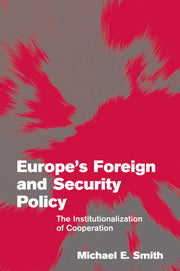Freshly Printed - allow 8 days lead
Couldn't load pickup availability
Europe's Foreign and Security Policy
The Institutionalization of Cooperation
An analysis of the growth of foreign and security policy cooperation between EU member states.
Michael E. Smith (Author)
9780521831352, Cambridge University Press
Hardback, published 13 November 2003
308 pages, 13 tables
22.9 x 15.2 x 2.1 cm, 0.62 kg
"Smith's important work deserves to be included in the canon of European foreign policy theoretical texts. It nicely rounds out our theoretical knowledge of the role of institutions in European foreign policy cooperation and is strongly recommended to those, like Smith, who are intrigued by the unprecendented degree of foreign policy cooperation among the 25 members of the European Union." APSA Perspectives on Politics
The emergence of a common security and foreign policy has been one of the most contentious issues accompanying the integration of the European Union. In this book, Michael Smith examines the specific ways foreign policy cooperation has been institutionalized in the EU, the way institutional development affects cooperative outcomes in foreign policy, and how those outcomes lead to new institutional reforms. Smith explains the evolution and performance of the institutional procedures of the EU using a unique analytical framework, supported by extensive empirical evidence drawn from interviews, case studies, official documents and secondary sources. His perceptive and well-informed analysis covers the entire history of EU foreign policy cooperation, from its origins in the late 1960s up to the start of the 2003 constitutional convention. Demonstrating the importance and extent of EU foreign/security policy, the book will be of interest to scholars, researchers and policy-makers.
List of tables
Acknowledgements
List of abbreviations
Introduction: foreign and security policy in the European Union
Part I. Institutions and Foreign Policy Cooperation: The Theoretical and Empirical Terrain: 1. The institutionalization of cooperation: an analytical framework
2. Institutions and European foreign policy cooperation: the empirical link
Part II. The Institutionalization of Cooperation: 3. Origins: intergovernmentalism and European political pooperation
4. Information-sharing and the transgovernmental EPC network
5. Norms, rules and laws in European foreign policy
6. Organizations and European foreign policy
7. Toward governance: the Common Foreign and Security Policy
Part III. Residual Institutional Issues: 8. Unfinished business: coherence and the EU's global ambitions
Conclusion: beyond the CFSP: institutions, defense and the European identity
References
Index.
Subject Areas: EU & European institutions [JPSN2], International relations [JPS], Regional studies [GTB]


